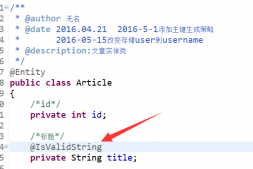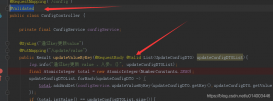数据缓存原因:有些数据比较多,如果每次访问都要进行查询,无疑给数据库带来太大的负担,将一些庞大的查询数据并且更新次数较少的数据存入redis,能为系统的性能带来良好的提升。
业务逻辑思路:登入系统,访问数据时,检查redis是否有缓存,有则直接从redis中提取,没有则从数据库查询出,并存入redis中做缓存。
为什么要用redis做缓存:
(1)异常快速:redis的速度非常快,每秒能执行约11万集合,每秒约81000+条记录。
(2)支持丰富的数据类型:redis支持最大多数开发人员已经知道像列表,集合,有序集合,散列数据类型。这使得它非常容易解决各种各样的问题,因为我们知道哪些问题是可以处理通过它的数据类型更好。
(3)操作都是原子性:所有redis操作是原子的,这保证了如果两个客户端同时访问的redis服务器将获得更新后的值。
(4)多功能实用工具:redis是一个多实用的工具,可以在多个用例如缓存,消息,队列使用(redis原生支持发布/订阅),任何短暂的数据,应用程序,如web应用程序会话,网页命中计数等。
缓存实现思路:
- 项目中配置好redis账户等属性文件(redis.properties)
- 整合到spring容器中(application-redis.xml)
- 编写redis工具类
一、项目中配置好redis账户等属性文件(redis.properties)
|
1
2
3
4
5
6
7
8
9
10
11
12
13
14
15
16
17
18
19
20
21
22
23
24
25
26
|
#ip地址redis.hostname=youripaddress#端口号redis.port=6379#如果有密码redis.password=yourredispassword#客户端超时时间单位是毫秒 默认是2000redis.timeout=10000#最大空闲数redis.maxidle=300#连接池的最大数据库连接数。设为0表示无限制,如果是jedis 2.4以后用redis.maxtotal#redis.maxactive=600#控制一个pool可分配多少个jedis实例,用来替换上面的redis.maxactive,如果是jedis 2.4以后用该属性redis.maxtotal=1000#最大建立连接等待时间。如果超过此时间将接到异常。设为-1表示无限制。redis.maxwaitmillis=1000#连接的最小空闲时间 默认1800000毫秒(30分钟)redis.minevictableidletimemillis=300000#每次释放连接的最大数目,默认3redis.numtestsperevictionrun=1024#逐出扫描的时间间隔(毫秒) 如果为负数,则不运行逐出线程, 默认-1redis.timebetweenevictionrunsmillis=30000#是否在从池中取出连接前进行检验,如果检验失败,则从池中去除连接并尝试取出另一个redis.testonborrow=true#在空闲时检查有效性, 默认falseredis.testwhileidle=true |
二、整合到spring容器中(application-redis.xml)
|
1
2
3
4
5
6
7
8
9
10
11
12
13
14
15
16
17
18
19
20
21
22
23
24
25
26
27
28
29
30
31
32
33
34
35
36
37
38
39
40
41
42
43
44
45
46
47
48
49
50
51
52
53
54
55
56
57
58
59
60
61
62
63
64
65
66
67
68
69
70
71
72
73
74
|
<?xml version="1.0" encoding="utf-8"?> <beans xmlns="http://www.springframework.org/schema/beans" xmlns:xsi="http://www.w3.org/2001/xmlschema-instance" xmlns:p="http://www.springframework.org/schema/p" xmlns:context="http://www.springframework.org/schema/context" xmlns:mvc="http://www.springframework.org/schema/mvc" xmlns:cache="http://www.springframework.org/schema/cache" xmlns:aop="http://www.springframework.org/schema/aop" xsi:schemalocation="http://www.springframework.org/schema/beans http://www.springframework.org/schema/beans/spring-beans.xsd http://www.springframework.org/schema/context http://www.springframework.org/schema/context/spring-context.xsd http://www.springframework.org/schema/mvc http://www.springframework.org/schema/mvc/spring-mvc.xsd http://www.springframework.org/schema/cache http://www.springframework.org/schema/cache/spring-cache.xsd http://www.springframework.org/schema/aop http://www.springframework.org/schema/aop/spring-aop.xsd"> <!-- 加载配置文件 --> <context:property-placeholder ignore-unresolvable="true" location="classpath:properties/redis.properties" /> <!-- redis连接池配置--> <bean id="jedispoolconfig" class="redis.clients.jedis.jedispoolconfig" > <!--最大空闲数--> <property name="maxidle" value="${redis.maxidle}" /> <!--连接池的最大数据库连接数 --> <property name="maxtotal" value="${redis.maxtotal}" /> <!--最大建立连接等待时间--> <property name="maxwaitmillis" value="${redis.maxwaitmillis}" /> <!--逐出连接的最小空闲时间 默认1800000毫秒(30分钟)--> <property name="minevictableidletimemillis" value="${redis.minevictableidletimemillis}" /> <!--每次逐出检查时 逐出的最大数目 如果为负数就是 : 1/abs(n), 默认3--> <property name="numtestsperevictionrun" value="${redis.numtestsperevictionrun}" /> <!--逐出扫描的时间间隔(毫秒) 如果为负数,则不运行逐出线程, 默认-1--> <property name="timebetweenevictionrunsmillis" value="${redis.timebetweenevictionrunsmillis}" /> <!--是否在从池中取出连接前进行检验,如果检验失败,则从池中去除连接并尝试取出另一个--> <property name="testonborrow" value="${redis.testonborrow}" /> <!--在空闲时检查有效性, 默认false --> <property name="testwhileidle" value="${redis.testwhileidle}" /> </bean > <!--redis连接工厂 --> <bean id="jedisconnectionfactory" class="org.springframework.data.redis.connection.jedis.jedisconnectionfactory" destroy-method="destroy"> <property name="poolconfig" ref="jedispoolconfig"></property> <!--ip地址 --> <property name="hostname" value="${redis.hostname}"></property> <!--端口号 --> <property name="port" value="${redis.port}"></property> <!--如果redis设置有密码 --> <property name="password" value="${redis.password}" /> <!--客户端超时时间单位是毫秒 --> <property name="timeout" value="${redis.timeout}"></property> </bean> <!--redis操作模版,使用该对象可以操作redis --> <bean id="redistemplate" class="org.springframework.data.redis.core.redistemplate" > <property name="connectionfactory" ref="jedisconnectionfactory" /> <!--如果不配置serializer,那么存储的时候缺省使用string,如果用user类型存储,那么会提示错误user can't cast to string!! --> <property name="keyserializer" > <bean class="org.springframework.data.redis.serializer.stringredisserializer" /> </property> <property name="valueserializer" > <bean class="org.springframework.data.redis.serializer.genericjackson2jsonredisserializer" /> </property> <property name="hashkeyserializer"> <bean class="org.springframework.data.redis.serializer.stringredisserializer"/> </property> <property name="hashvalueserializer"> <bean class="org.springframework.data.redis.serializer.genericjackson2jsonredisserializer"/> </property> <!--开启事务 --> <property name="enabletransactionsupport" value="true"></property> </bean > <!--自定义redis工具类,在需要缓存的地方注入此类 --> <bean id="redisutil" class="com.neuedu.crm.utils.redisutil"> <property name="redistemplate" ref="redistemplate" /> </bean> </beans> |
三、编写redis工具类
|
1
2
3
4
5
6
7
8
9
10
11
12
13
14
15
16
17
18
19
20
21
22
23
24
25
26
27
28
29
30
31
32
33
34
35
36
37
38
39
40
41
42
43
44
45
46
47
48
49
50
51
52
53
54
55
56
57
58
59
60
61
62
63
64
65
66
67
68
69
70
71
72
73
74
75
76
77
78
79
80
81
82
83
84
85
86
87
88
89
90
91
92
93
94
95
96
97
98
99
100
101
102
103
104
105
106
107
108
109
110
111
112
113
114
|
package com.neuedu.crm.utils;import java.io.serializable;import java.util.set;import java.util.concurrent.timeunit;import org.slf4j.logger;import org.slf4j.loggerfactory;import org.springframework.data.redis.core.redistemplate;import org.springframework.data.redis.core.valueoperations;/** * redis工具类 * :用于缓存数据 * */public class redisutil { private logger logger = loggerfactory.getlogger(redisutil.class); private redistemplate<serializable, object> redistemplate; public void setredistemplate(redistemplate<serializable, object> redistemplate) { this.redistemplate = redistemplate; } /** * 批量删除对应的value * * @param keys */ public void remove(final string... keys) { for (string key : keys) { remove(key); } } /** * 批量删除key * * @param pattern */ public void removepattern(final string pattern) { set<serializable> keys = redistemplate.keys(pattern); if (keys.size() > 0) { redistemplate.delete(keys); } } /** * 删除对应的value * * @param key */ public void remove(final string key) { logger.info("要移除的key为:" + key); if (exists(key)) { redistemplate.delete(key); } } /** * 判断缓存中是否有对应的value * * @param key * @return */ public boolean exists(final string key) { logger.info("要验证是否存在的key为:" + key); return redistemplate.haskey(key); } /** * 读取缓存 * * @param key * @return */ public object get(final string key) { object result = null; valueoperations<serializable, object> operations = redistemplate .opsforvalue(); result = operations.get(key); return result; } /** * 写入缓存 * * @param key * @param value * @return */ public boolean set(final string key, object value) { boolean result = false; try { valueoperations<serializable, object> operations = redistemplate .opsforvalue(); operations.set(key, value); result = true; } catch (exception e) { logger.error("系统异常",e); } return result; } /** * 写入缓存 * * @param key * @param value * @return */ public boolean set(final string key, object value, long expiretime) { boolean result = false; try { valueoperations<serializable, object> operations = redistemplate .opsforvalue(); operations.set(key, value); redistemplate.expire(key, expiretime, timeunit.seconds); result = true; } catch (exception e) { logger.error("系统异常",e); } return result; }} |
注意点:redis工具类由spring进行托管,则在需要缓存的地方注入redis工具类即可。
总结
以上所述是小编给大家介绍的spring整合redis实现数据缓存的实例代码,希望对大家有所帮助,如果大家有任何疑问欢迎给我留言,小编会及时回复大家的!
原文链接:https://blog.csdn.net/chenjianzhou107/article/details/82724947















